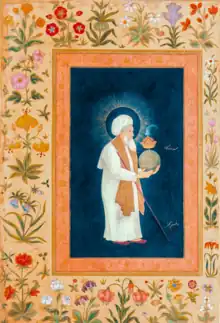Moin-ud-din Chishti
Hazrat Sheikh Khwaja Moin-ud-din Chishti Ajmeri, was born in 1141 and died in 1236 AD. He is also known as "Khwaja Muinuddin Chisti" and "Gharīb Nawāz" (Benefactor of the Poor). He is the most famous Sufi saint of the Chishti order of South Asia. Moinuddin Chishti is believed to have introduced and established this Order in India. His shrine is at Ajmer, Rajasthan, India.[7]
Muʿīn al-Dīn Chishtī | |
|---|---|
معین الدین چشتی ؓ | |
 A Mughal miniature representing Muʿīn al-Dīn Chishtī | |
| Other names | Khawja Ghareeb Nawaz, Sultan Ul Hind |
| Personal | |
| Born | 1 February 1143 |
| Died | 15 March 1236 (aged 92–93) |
| Resting place | Ajmer Sharif Dargah |
| Religion | Islam |
| Flourished | Islamic golden age |
| Children | Three sons—Abū Saʿīd, Fak̲h̲r al-Dīn and Ḥusām al-Dīn — and one daughter Bībī Jamāl. |
| Parents | Khwāja G̲h̲iyāt̲h̲ al-Dīn Ḥasan, Umm al-Wara |
| Denomination | Sunni[2][3] |
| Jurisprudence | Hanafi |
| Creed | Maturidi |
| Tariqa | Chishti (Founder) |
| Other names | Khawja Ghareeb Nawaz, Sultan Ul Hind |
| Profession | Islamic preacher |
| Senior posting | |
Influenced by
| |
Influenced
| |
| Profession | Islamic preacher |
The main beliefs of Khwaja Moinuddin Chishti were achieving oneness with Allah, devotion to the Divine, leading a pure life, showing compassion and charity for the helpless and poor.
References
- "Chishti, Mu'in al-Din Muhammad". Oxford Islamic Studies.
- Francesca Orsini and Katherine Butler Schofield, Telling and Texts: Music, Literature, and Performance in North India (Open Book Publishers, 2015), p. 463
- Arya, Gholam-Ali and Negahban, Farzin, "Chishtiyya", in: Encyclopaedia Islamica, Editors-in-Chief: Wilferd Madelung and, Farhad Daftary: "The followers of the Chishtiyya Order, which has the largest following among Sufi orders in the Indian subcontinent, are Ḥanafī Sunni Muslims."
- Ḥamīd al-Dīn Nāgawrī, Surūr al-ṣudūr; cited in Auer, Blain, "Chishtī Muʿīn al-Dīn Ḥasan", in: Encyclopaedia of Islam, THREE, Edited by: Kate Fleet, Gudrun Krämer, Denis Matringe, John Nawas, Everett Rowson.
- Blain Auer, "Chishtī Muʿīn al-Dīn Ḥasan", in: Encyclopaedia of Islam, THREE, Edited by: Kate Fleet, Gudrun Krämer, Denis Matringe, John Nawas, Everett Rowson.
- Arya, Gholam-Ali; Negahban, Farzin. "Chishtiyya". In Madelung, Wilferd; Daftary, Farhad (eds.). Encyclopaedia Islamica.
- "Ajmer Sharif Dargah, Khwaja Garib Nawaz Rajasthan, India". Ajmer Sharif Dargah. Retrieved 7 January 2024.
This article is issued from Wikipedia. The text is licensed under Creative Commons - Attribution - Sharealike. Additional terms may apply for the media files.